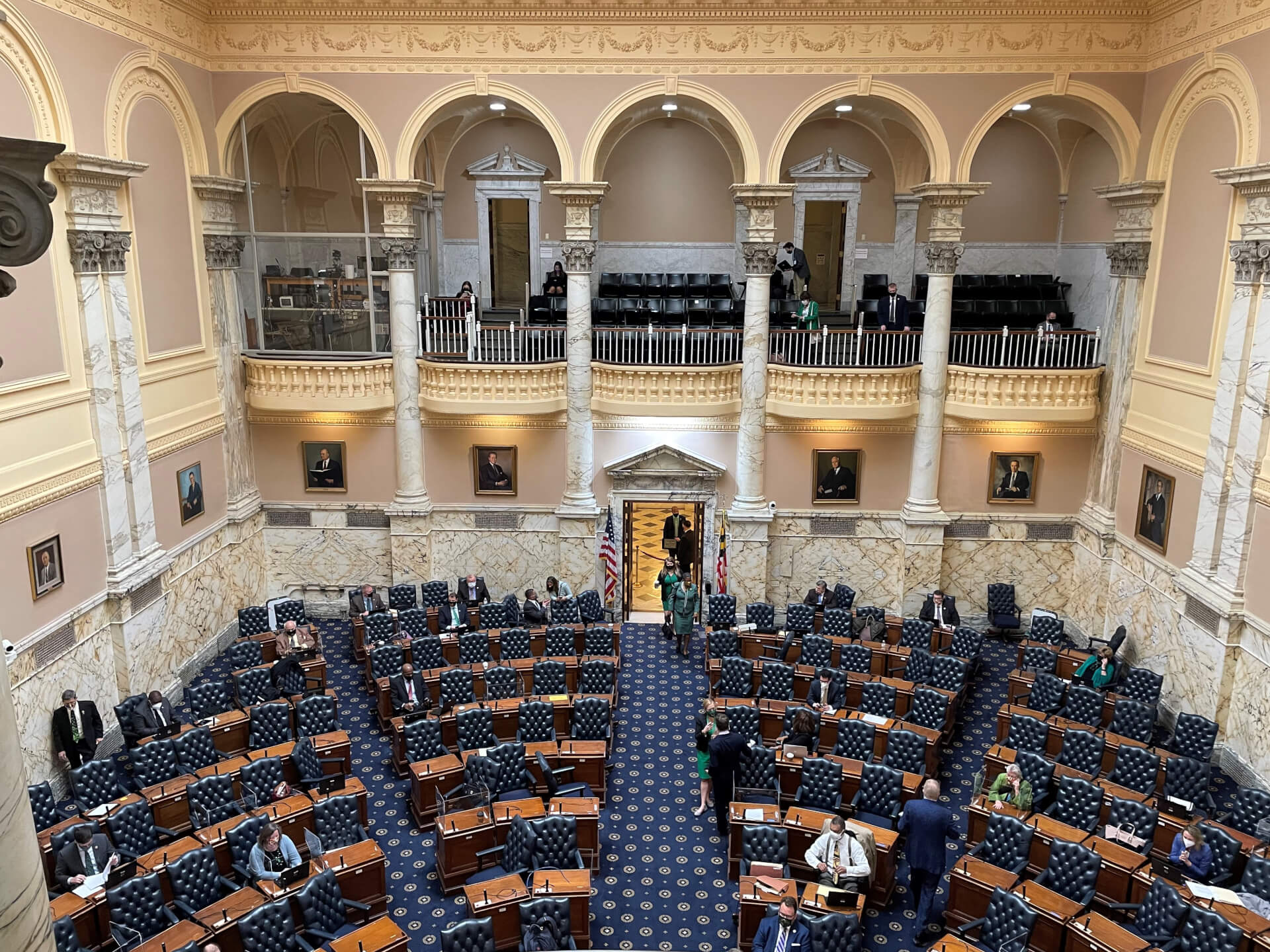House Passes Bill to End Life Without Parole For Juvenile Offenders, Allow Re-Sentencings

After a winding debate that dwelled on concepts of redemption, justice, religion – and, at times, raw politics — the House of Delegates approved a bill that prohibits life without parole sentences for juvenile offenders.
The bill also establishes a process by which juvenile offenders may seek reconsideration of prior sentences if they were convicted as an adult and have been imprisoned for at least 20 years.
Debate over the measure dominated morning and evening floor sessions of the House, as the chamber moved forward both the House version of the measure sponsored by Del. Jazz Lewis (D-Prince George’s) and the crossfiled Senate bill sponsored by Sen. Christopher R. West (R-Baltimore County) and others.
GOP delegates attempted a series of seven amendments to the House bill. Several amendments sought to remove certain crimes from eligibility for sentence review, including police killings, hate crimes and attacks on elderly victims.
Del. Haven Shoemaker (R-Carroll) said criminal sentences serve multiple functions: punishment, deterrence and, when appropriate, redemption.
“Folks, I’m here to tell you after 28 years in the law business, there are folks who are irredeemable,” he said, arguing against the bill.
Democrats who support the bill agreed that some crimes described on the House floor were heinous acts, but said the court system should not be motivated by vengeance and that those who commit crimes as teenagers should not be sentenced the same as adults.
“It’s incredibly hard for us to talk about redemption, in this context. …We want to talk about vengeance,” House Judiciary Chairman Luke Clippinger (D-Baltimore City) said. “We can’t be that as a people, we can’t be that as prosecutors, and our justice system cannot be about that. We have to believe in that spark of redemption in every single person. Even those people who have done the most heinous, horrible crimes.”
Politics flared during debate on an amendment from Del. Kevin B. Hornberger (R-Cecil), which would have stopped the bill from applying to people “convicted of a crime involving the possession or discharge of a firearm inside a school building or a conspiracy to commit a crime involving a firearm inside a school building.”
Del. Richard W. Metzgar (R-Baltimore County) argued in favor of the amendment, and said people convicted of school shootings should be left out of the bill because of the amount of planning that goes into a mass murder.
“They’re not just spontaneous actions,” Metzgar said of school shootings. “It’s a different kind of mood, it’s a different kind of mind. It’s a kind of evil that perpetrates such evils.”
He also warned that lawmakers who opposed the amendment could face trouble on the campaign trail if the bill passes without such an amendment.
“When these folks look up at these votes, and you tell them you’re tough on crime, and they see how you voted, I can guarantee you, those of you who are running for office, you’re going to see a mailer,” Metzgar said.
That warning drew a swift rebuke from Clippinger.
“I want to take a polite exception to the gentleman from Baltimore County’s words that we need to be worried about a piece of mail showing up in our mailboxes because we’re running for election on this issue,” Clippinger said. “That’s your driving force on this issue? Is that what you really care about? Then why are you here?”
Clippinger said his committee works long hours debating how to legislate issues of life and death.
“And at the end of the day, I like to believe that we also deal with them justly. We deal with them, knowing that there are victims, knowing that there are people who were irreparably harmed by these crimes,” Clippinger said. “…And we try to do them in the best way that we can in the most just way that we can. And we don’t give a damn about a mailer.”
Hornberger’s amendment failed in a 51-83 vote.
Del. Jason C. Buckel (R-Allegany) introduced an amendment that would’ve banned the bill from applying to past offenses, meaning only newly convicted people could take advantage of the bill. His amendment would’ve also banned the proposal from applying to juveniles convicted as adults.
Buckel recounted the story of Nicholas Browning – who was 15 when he killed his family and two of his siblings in 2008. Buckel said he knew Browning’s family, and argued some crimes should be punished with life imprisonment.
“You cannot cross certain lines and still remain a member of our society,” Buckel said.
But Clippinger noted that Browning’s grandparents, who regularly visit their grandson in prison, wrote in support of the proposal. Browning could eventually be eligible for parole, since prosecutors didn’t pursue life without the possibility of parole as part of a plea deal.
Buckel’s amendment was rejected in a 52-83 vote.
Del. Nino Mangione (R-Baltimore County) introduced an amendment to remove people convicted as an adult for more than one murder when they were a minor from the bill. He said Lee Boyd Malvo, who was sentenced to life without the possibility of parole in the D.C. sniper case, was 17 at the time of the attacks.
“An entire region lived in fear that they could be next as these evildoers were killing at random like it was sport,” Mangione said.
Mangione said the possibility of life without the possibility of parole could “deter future acts of violence” in pushing for his amendment.
Lewis, the bill sponsor, said he introduced the bill partly because of the advocacy of Paul LaRuffa, who was shot by Malvo during the 2002 attacks. LaRuffa said at a news conference earlier this month that he supports Lewis’ bill.
“What this bill does is it gives hope: it gives hope to people, who are facing 30, 40, 50, 60 years behind bars, and the only thing they know is that they will die behind the same walls they look at today,” LaRuffa said.
On Tuesday, Lewis noted that other states have enacted similar laws and seen a low recidivism rate, and emphasized that the bill doesn’t guarantee a changed sentence for people sentenced as juveniles.
“I think that what we are doing is sound policy that’s proven in half the country,” said Lewis, who noted that 25 other states — some in a more bipartisan fashion — have passed some form of his bill after the Supreme Court ruled it unconstitutional to sentence minors to death or mandatory life without parole sentences.
Mangione’s proposal was rejected in a 54-79 vote.
The Senate bill received final passage in the House by an 88-48 vote. It now heads back to the Senate, where the chamber can agree to the House amendments, or force a negotiation on the differences.
The primary difference between the two bills is the House’s removal of a section authorizing judges to require certain actions — such as completion of an abuse treatment or GED program — as a condition of release.





 Creative Commons Attribution
Creative Commons Attribution